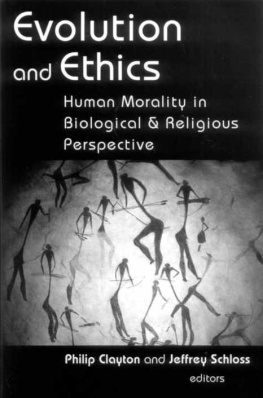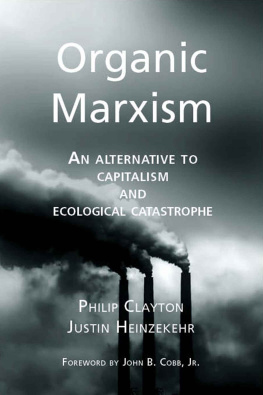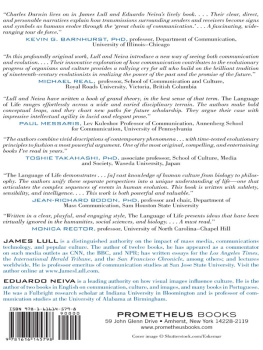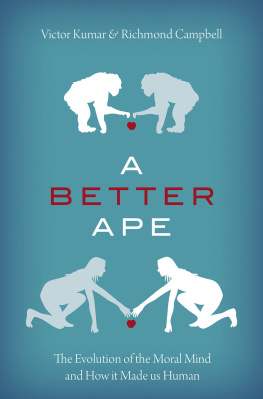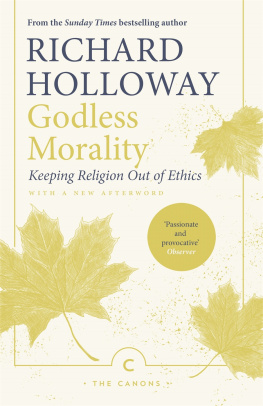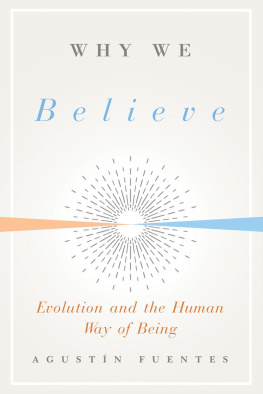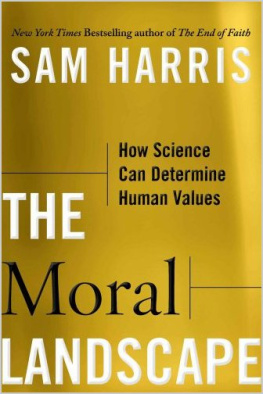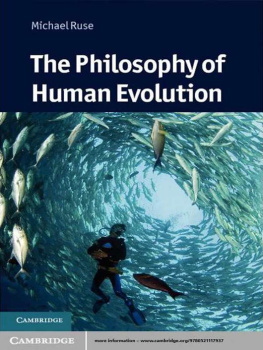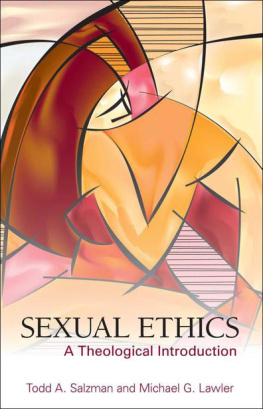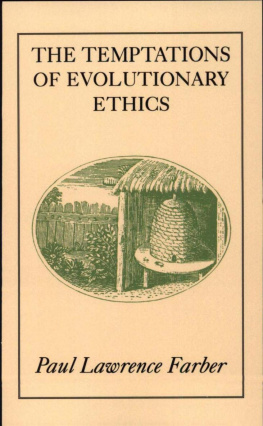EVOLUTION AND ETHICS
EVOLUTION AND ETHICS
Human Morality in Biological
and Religious Perspective
Edited by
Philip Clayton and Jeffrey Schloss




Contents
ix
Jeffrey P. Schloss
1. The Evolution of Ethics: Scientific Perspectives
Michael Ruse
Peter J. Richerson and Robert Boyd
Christopher Boehm
Michael J. Chapman
Joseph Poulshock
David C. Lahti
II. Religious and Evolutionary Ethics - Are They Compatible?
Loren Haarsma
Rene van Woudenberg
John Hare
Larry Arnhart
Craig A. Boyd
Holmes Rolston III
III. The Ethics of Evolution: Theological Evaluation and Critique
S. Mark Heim
Gregory R. Peterson
Thomas Jay Oord
Philip A. Rolnick
Philip Clayton
Preface
This book is far more than a random collection of papers that happened to have been presented at a conference somewhere. The majority of the authors spent four weeks in residence together at Calvin College during a recent summer, engaged in intensive study and debate concerning the core questions of this book. We are grateful to the John Templeton Foundation, without whose generous funding this collaborative project would not have been possible, and to the Seminars in Christian Scholarship program of Calvin College, which hosted this research consultation, especially to Susan Felch, its Director, and to Anna Mae Bush, Kara Vandrie, and their staff.
With the financial assistance of the Templeton Foundation, we were able to bring in leading figures in the field for extended discussion and debate. The in-depth interactions that took place over the summer with the scientists Richard Alexander, David Sloan Wilson, and Malcolm Jeeves, and with the theologians Niels Gregersen and Kevin Vanhoozer, were a testing ground for the proposals made in this volume. Each paper was then presented and critiqued at a major conference at Calvin College in November, 2002. Joining us as keynote speakers at the conference were Larry Arnhart, Christopher Boehm, Thomas Lewis, Peter Richerson, and Holmes Rolston III. All but one of their papers have been added to this summary of the project's conclusions. In addition, we have been able to include papers by Michael Ruse, Joseph Poulshock, and David Lahti, which were written expressly for this volume, since their research results bear directly on the "evolution and ethics" debate.
Not all of the papers written by members of the core research group were focused directly on the topic of this book, and so not all of their papers could be included in this volume. Each core participant, however, has contributed substantially to these published results through his or her research, ideas, criticisms, and comments. We gratefully acknowledge our intellectual and personal debt to these other colleagues: Stacey Ake, Dan Brannan, Eduardo de la Cruz, Alvin Plantinga, Richard Weikert, and Doug Vakoch.
During four years of working together on this project I have come increasingly to respect the level of scholarship in both biology and theology brought by my co-organizer and co-editor, Jeffrey Schloss. Without his unparalleled sense for the tensions between these two fields, but also for the exciting opportunities for integration that they present, this project would not have achieved the significant results that it has. Finally, the heavy burden of turning a wide-ranging research project into a coherent book was carried in large part by my assistants Kevin Cody and Andrea Zimmerman, to whom I express my deep appreciation.
PHILIP CLAYTON
Claremont School of Theology
May 2004
INTRODUCTION
Evolutionary Ethics and Christian Morality:
Surveying the Issues
Jeffrey P. Schloss
MncDUFF: What? All my pretty Chickens, and their Damme at one fell swoop?
MALCOMB: Bear it like a man!
MncDUFF: I shall do so: But I must first also feel it as a man.
Shakespeare, Macbeth, act 4, scene 3
Over the last 150 years many Christians have viewed evolutionary theory as attempting to slay cherished elements - "all our pretty chickens" - of theological and moral belief. Indeed, not only Christians but also evolutionary theorists themselves have asserted this, both historically and currently (T. H. Huxley [1894] 1989; Dewey [1909] 1988; J. Huxley 1960; Rachels 1990; Dennett 1995; Dawkins 1997 and 2003). In the face of this conflict, exhortations to engagement are common, in a sense urging us to "bear it like a man!"
Understandings of what is entailed by proper engagement vary wildly, though. For some, it means beating back the evolutionary enemy, especially along the front lines of ethical conflict (Johnson 1998 and 2002; Hunter 2001 and 2003; Wiker 2002; Morris 2000). For others, it means coming to see there is no real battle (Pope 1994; Gould 1999; Miller 1999). For others still, it means recognizing the conflict is real, but theology can be enriched by making concessions of territory that was not properly managed to begin with, or modifications to our maps of terrain inaccurately surveyed: "the challenge by Darwin to theology ... may prove to be not so much peril as gift" (Haught 2000, 46; cf. P. Williams 2001; Hefner 1993). The premise of this volume is that before we decide what it means to "bear" the issue with dignity, we must first "feel" it with integrity. We must openly survey the issues before advocating a response.
Just what are the "issues," then? The tension between evolutionary theory and Christian belief is often viewed as the most recent (and also long standing) instance of defensive posturing by religion in the face of advancing scientific understanding, which has progressively overrun outposts of belief in the supernatural by the firepower of naturalistic explanation (White 1955; Dennett 1995; Dawkins 2000 and 2003). But this is simultaneously saying too much and too little. It is saying too much, not only because this warfare account of science and religion itself is hyperbolic and over-generalized (Brooke 1991; Brooke and Cantor 200o; Lindberg and Numbers 1986 and 2003), but also because the most serious and widespread Christian resistance to evolutionary theory has never really centered on defending particular supernatural accounts of how creation occurred. Rather, it has involved fundamental beliefs about what kind of creation we have. Indeed, the issue has appeared to be whether the cosmos can properly be conceived of as a creation at all, or for that matter, as a cosmos rather than a chaos, where the reality of nature and humanity's place in it is grounded in and reflective of coherent moral purpose.
So here is where generic science-religion skirmish accounts say too little. On the face of things, particularly when it comes to matters of ethics and human purpose, we seem to be dealing with two profoundly different metanarratives in evolutionary naturalism and Christian theism (Wilson 1978; Rachels 1990; Smith 2003). Western theism has traditionally affirmed a transcendent creator of and purpose to life, which the design of the cosmos manifestly, even jubilantly, testifies to; and it has embraced the conviction that human beings, fashioned in the Creator's image, are specially suited to apprehend and cultivate that purpose, in a moral vision of self-giving and unconditional love. Philosopher James Rachels (1990, 5) is by no means alone in pointing out that, in contrast to the traditional Western view, "Darwin's great contribution was the final demolition of the idea that nature is the product of intelligent design," and that evolutionary theory "undermines the idea that man is made in the image of God.... The idea of human dignity turns out, therefore, to be the moral effluvium of a discredited metaphysics." In an essay that explores the issue of incommensurability between evolutionary biology and the Christian love command, Michael Ruse (1994, 5) cautions that "those who are worried about the clash between science and religion have good reasons for their worries."

